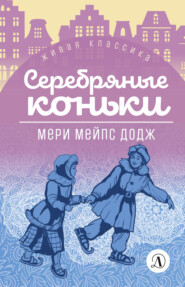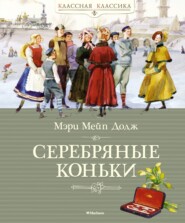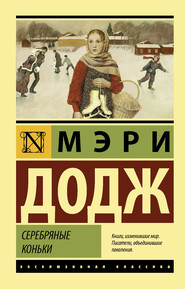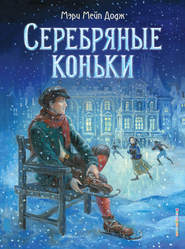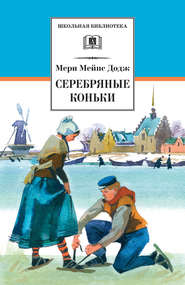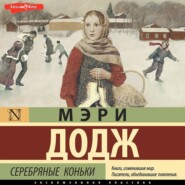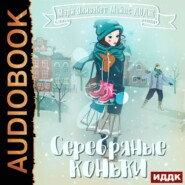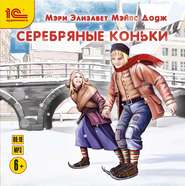По всем вопросам обращайтесь на: info@litportal.ru
(©) 2003-2025.
✖
Hans Brinker, or the Silver Skates / Серебряные коньки. Книга для чтения на английском языке
Настройки чтения
Размер шрифта
Высота строк
Поля
Master Broom colored and stared in great astonishment.
“But thou art such an excellent scholar, I shall make thee no further reproof.”
“Thou, Hendrick, didst distinguish thyself in the archery match last spring, and hit the Doel[93 - hit the Doel – (разг.) попал прямо в яблочко (примеч. авт.)] though the bird was swung before it to unsteady thine eye. I give thee credit for excelling in manly sport and exercise, though I must not unduly countenance thy boat racing, since it leaves thee little time for thy proper studies.
“Lucretia and Hilda shall have a blessed sleep tonight. The consciousness of kindness to the poor, devotion in their souls, and cheerful, hearty obedience to household rule will render them happy.
“With one and all I avow myself well content. Goodness, industry, benevolence, and thrift have prevailed in your midst. Therefore, my blessing upon you – and may the new year find all treading the paths of obedience, wisdom, and love. Tomorrow you shall find more substantial proofs that I have been in your midst. Farewell!”
With these words came a great shower of sugarplums, upon a linen sheet spread out in front of the doors. A general scramble followed. The children fairly tumbled over each other in their eagerness to fill their baskets. Madame cautiously held the baby down in their midst, till the chubby little fists were filled. Then the bravest of the youngsters sprang up and burst open the closed doors. In vain they peered into the mysterious apartment. Saint Nicholas was nowhere to be seen.
Soon there was a general rush to another room, where stood a table, covered with the finest and whitest of linen damask. Each child, in a flutter of excitement, laid a shoe upon it. The door was then carefully locked, and its key hidden in the mother’s bedroom. Next followed goodnight kisses, a grand family procession to the upper floor, merry farewells at bedroom doors, and silence, at last, reigned in the Van Gleck mansion.
Early the next morning the door was solemnly unlocked and opened in the presence of the assembled household, when lo! a sight appeared, proving Saint Nicholas to be a saint of his word!
Every shoe was filled to overflowing[94 - was filled to overflowing – (разг.) был наполнен с верхом], and beside each stood many a colored pile. The table was heavy with its load of presents – candies, toys, trinkets, books, and other articles. Everyone had gifts, from the grandfather down to the baby.
Little Katy clapped her hands with glee and vowed inwardly that the cat should never know another moment’s grief[95 - vowed inwardly that the cat should never know another moment’s grief – (разг.) про себя поклялась, что у кота никогда больше не будет повода печалиться].
Hendrick capered about the room, flourishing a superb bow and arrows over his head. Hilda laughed with delight as she opened a crimson box and drew forth its glittering contents. The rest chuckled and said “Oh!” and “Ah!” over their treasures, very much as we did here in America on last Christmas Day.
With her glittering necklace in her hands, and a pile of books in her arms, Hilda stole towards her parents and held up her beaming face for a kiss. There was such an earnest, tender look in her bright eyes that her mother breathed a blessing as she leaned over her.
“I am delighted with this book. Thank you, Father,” she said, touching the top one with her chin. “I shall read it all day long.”
“Aye, sweetheart,” said mynheer, “you cannot do better. There is no one like Father Cats[96 - Father Cats – Якоб Катс (1577–1660), нидерландский поэт]. If my daughter learns his Moral Emblems by heart, the mother and I may keep silent. The work you have there is the Emblems – his best work. You will find it enriched with rare engravings from Van de Venne.”
Considering that the back of the book was turned away, mynheer certainly showed a surprising familiarity with an unopened volume, presented by Saint Nicholas. It was strange, too, that the saint should have found certain things made by the elder children and had actually placed them upon the table, labeled with parents’ and grandparents’ names. But all were too much absorbed in happiness to notice slight inconsistencies. Hilda saw, on her father’s face, the rapt expression he always wore when he spoke of Jakob Cats, so he put her armful of books upon the table and resigned herself to listen.
“Old Father Cats, my child, was a great poet, not a writer of plays like the Englishman, Shakespeare, who lived in his time. I have read them in the German and very good they are – very, very good – but not like Father Cats. Cats sees no daggers in the air; he has no white women falling in love with dusky Moors; no young fools sighing to be a lady’s glove; no crazy princes mistaking respectable old gentlemen for rats. No, no. He writes only sense.
It is great wisdom in little bundles, a bundle for every day of your life. You can guide a state with Cats’s poems, and you can put a little baby to sleep with his pretty songs. He was one of the greatest men of Holland. When I take you to The Hague, I will show you the Kloosterkerk where he lies buried. THERE was a man for you to study, my sons! He was good through and through. What did he say?
“O Lord, let me obtain this from Thee
To live with patience, and to die with pleasure!
“Did patience mean folding his hands? No, he was a lawyer, statesman, ambassador, farmer, philosopher, historian, and poet. He was keeper of the Great Seal of Holland! He was a – Bah! there is too much noise here, I cannot talk.” And mynheer, looking with great astonishment into the bowl of his meerschaum, for it had gone out[98 - it had gone out – (разг.) она потухла], nodded to his vrouw and left the apartment in great haste.
The fact is, his discourse had been accompanied throughout with a subdued chorus of barking dogs, squeaking cats, and bleating lambs, to say nothing of a noisy ivory cricket that the baby was whirling with infinite delight. At the last, little Huygens, taking advantage of the increasing loudness of mynheer’s tones, had ventured a blast on his new trumpet, and Wolfert had hastily attempted an accompaniment on the drum. This had brought matters to a crisis, and it was good for the little creatures that it had. The saint had left no ticket for them to attend a lecture on Jakob Cats. It was not an appointed part of the ceremonies. Therefore when the youngsters saw that the mother looked neither frightened nor offended, they gathered new courage. The grand chorus rose triumphant, and frolic and joy reigned supreme.
Good Saint Nicholas! For the sake of the young Hollanders, I, for one, am willing to acknowledge him and defend his reality against all unbelievers.
Carl Schummel was quite busy during that day, assuring little children, confidentially, that not Saint Nicholas but their own fathers and mothers had produced the oracle and loaded the tables. But WE know better than that.
And yet if this were a saint, why did he not visit the Brinker cottage that night? Why was that one home, so dark and sorrowful, passed by?
What the Boys Saw and Did in Amsterdam
“Are we all here?” cried Peter, in high glee, as the party assembled upon the canal early the next morning, equipped for their skating journey. “Let me see. As Jacob has made me captain, I must call the roll[99 - must call the roll – (разг.) должен провести перекличку]. Carl Schummel, you here?”
“Ya!”
“Jacob Poot!”
“Ya!”
“Benjamin Dobbs!”
“Ya-a!”
“Lambert van Mounen!”
“Ya!”
“That’s lucky! Couldn’t get on without YOU, as you’re the only one who can speak English. Ludwig van Holp!”
“Ya!”
“Voostenwalbert Schimmelpenninck!”
No answer.
“Ah, the little rogue has been kept at home! Now, boys, it’s just eight o’clock – glorious weather, and the Y is as firm as a rock. We’ll be at Amsterdam in thirty minutes. One, two, three, START!”
True enough, in less than half an hour they had crossed a dike of solid masonry and were in the very heart of the great metropolis of the Netherlands – a walled city of ninety-five islands and nearly two hundred bridges. Although Ben had been there twice since his arrival in Holland, he saw much to excite wonder, but his Dutch comrades, having lived nearby all their lives, considered it the most matter-of-course place in the world[100 - the most matter-of-course place in the world – (разг.) самое обыкновенное (ничем не примечательное) место в мире]. Everything interested Ben: the tall houses with their forked chimneys and gable ends facing the street; the merchants’ ware rooms, perched high up under the roofs of their dwellings, with long, armlike cranes hoisting and lowering goods past the household windows; the grand public buildings erected upon wooden piles driven deep into the marshy ground; the narrow streets; the canals crossing the city everywhere; the bridges; the locks; the various costumes; and, strangest of all, shops and dwellings crouching close to the fronts of the churches, sending their long, disproportionate chimneys far upward along the sacred walls.
If he looked up, he saw tall, leaning houses, seeming to pierce the sky with their shining roofs. If he looked down, there was the queer street, without crossing or curb – nothing to separate the cobblestone pavement from the footpath of brick – and if he rested his eyes halfway, he saw complicated little mirrors (spionnen) fastened upon the outside of nearly every window, so arranged that the inmates of the houses could observe all that was going on in the street or inspect whoever might be knocking at the door, without being seen themselves.
Sometimes a dogcart, heaped with wooden ware[101 - a dogcart, heaped with wooden ware – (разг.) двуколка, нагруженная деревянными изделиями], passed him; then a donkey bearing a pair of panniers filled with crockery or glass; then a sled driven over the bare cobblestones (the runners kept greased with a dripping oil rag so that it might run easily); and then, perhaps, a showy but clumsy family carriage, drawn by the brownest of Flanders horses, swinging the whitest of snowy tails.
The city was in full festival array. Every shop was gorgeous in honor of Saint Nicholas. Captain Peter was forced, more than once, to order his men away from the tempting show windows, where everything that is, has been, or can be, thought of in the way of toys was displayed. Holland is famous for this branch of manufacture. Every possible thing is copied in miniature for the benefit of the little ones; the intricate mechanical toys that a Dutch youngster tumbles about in stolid unconcern would create a stir in our patent office. Ben laughed outright at some of the mimic fishing boats. They were so heavy and stumpy, so like the queer craft that he had seen about Rotterdam. The tiny trekschuiten, however, only a foot or two long, and fitted out, complete, made his heart ache. He so longed to buy one at once for his little brother in England. He had no money to spare[102 - had no money to spare – (разг.) не было лишних денег], for with true Dutch prudence, the party had agreed to take with them merely the sum required for each boy’s expenses and to consign the purse to Peter for safekeeping. Consequently Master Ben concluded to devote all his energies to sight-seeing and to think as seldom as possible of little Robby.
He made a hasty call at the Marine school and envied the sailor students their full-rigged brig and their sleeping berths swung over their trunks or lockers; he peeped into the Jews’ Quarter of the city, where the rich diamond-cutters and squalid old-clothesmen dwell, and wisely resolved to keep away from it; he also enjoyed hasty glimpses of the four principal avenues of Amsterdam – the Prinsengracht, Keizersgracht, Herengracht, and Singel. These are semicircular in form, and the first three average more than two miles in length. A canal runs through the center of each, with a well-paved road on either side, lined with stately buildings. Rows of naked elms, bordering the canal, cast a network of shadows over its frozen surface, and everything was so clean and bright that Ben told Lambert it seemed to him like petrified neatness.
Fortunately the weather was cold enough to put a stop to the usual street flooding and window-washing, or our young excursionists might have been drenched more than once. Sweeping, mopping, and scrubbing form a passion with Dutch housewives, and to soil their spotless mansions is considered scarcely less than a crime[103 - scarcely less than a crime – (разг.) чуть ли не преступление]. Everywhere a hearty contempt is felt for those who neglect to rub the soles of their shoes to a polish before crossing the doorsill; and in certain places visitors are expected to remove their heavy shoes before entering.
Sir William Temple[104 - Sir William Temple – сэр Вильям Темпл (1628–1699), английский дипломат, эссеист], in his memoirs of “What Passed in Christendom from 1672 to 1679,” tells a story of a pompous magistrate going to visit a lady of Amsterdam. A stout Holland lass opened the door, and told him in a breath that the lady was at home and that his shoes were not very clean. Without another word she took the astonished man up by both arms, threw him across her back, carried him through two rooms, set him down at the bottom of the stairs, seized a pair of slippers that stood there, and put them upon his feet. Then, and not until then, she spoke, telling him that his mistress was on the floor above, and that he might go up.
While Ben was skating with his friends upon the crowded canals of the city, he found it difficult to believe that the sleepy Dutchmen he saw around him, smoking their pipes so leisurely and looking as though their hats might be knocked off their heads without their making any resistance, were capable of those outbreaks that had taken place in Holland – that they were really fellow countrymen of the brave, devoted heroes of whom he had read in Dutch history.
As his party skimmed lightly along he told Van Mounen of a burial riot which in 1696 had occurred in that very city, where the women and children turned out, as well as the men, and formed mock funeral processions through the town, to show the burgomasters that certain new regulations, with regard to burying the dead would not be acceded to – how at last they grew so unmanageable and threatened so much damage to the city that the burgomasters were glad to recall the offensive law.
“There’s the corner,” said Jacob, pointing to some large buildings, where, about fifteen years ago, the great corn houses sank down in the mud. “They were strong affairs and set up on good piles, but they had over seven million pounds of corn in them, and that was too much.”
It was a long story for Jacob to tell, and he stopped to rest.
“How do you know there were seven million pounds in them?” asked Carl sharply. “You were in your swaddling clothes then.[105 - You were in your swaddling clothes then. – (разг.) В то время ты был еще младенцем.]”
“My father knows all about it,” was Jacob’s suggestive reply. Rousing himself with an effort, he continued, “Ben likes pictures. Show him some.”
“But thou art such an excellent scholar, I shall make thee no further reproof.”
“Thou, Hendrick, didst distinguish thyself in the archery match last spring, and hit the Doel[93 - hit the Doel – (разг.) попал прямо в яблочко (примеч. авт.)] though the bird was swung before it to unsteady thine eye. I give thee credit for excelling in manly sport and exercise, though I must not unduly countenance thy boat racing, since it leaves thee little time for thy proper studies.
“Lucretia and Hilda shall have a blessed sleep tonight. The consciousness of kindness to the poor, devotion in their souls, and cheerful, hearty obedience to household rule will render them happy.
“With one and all I avow myself well content. Goodness, industry, benevolence, and thrift have prevailed in your midst. Therefore, my blessing upon you – and may the new year find all treading the paths of obedience, wisdom, and love. Tomorrow you shall find more substantial proofs that I have been in your midst. Farewell!”
With these words came a great shower of sugarplums, upon a linen sheet spread out in front of the doors. A general scramble followed. The children fairly tumbled over each other in their eagerness to fill their baskets. Madame cautiously held the baby down in their midst, till the chubby little fists were filled. Then the bravest of the youngsters sprang up and burst open the closed doors. In vain they peered into the mysterious apartment. Saint Nicholas was nowhere to be seen.
Soon there was a general rush to another room, where stood a table, covered with the finest and whitest of linen damask. Each child, in a flutter of excitement, laid a shoe upon it. The door was then carefully locked, and its key hidden in the mother’s bedroom. Next followed goodnight kisses, a grand family procession to the upper floor, merry farewells at bedroom doors, and silence, at last, reigned in the Van Gleck mansion.
Early the next morning the door was solemnly unlocked and opened in the presence of the assembled household, when lo! a sight appeared, proving Saint Nicholas to be a saint of his word!
Every shoe was filled to overflowing[94 - was filled to overflowing – (разг.) был наполнен с верхом], and beside each stood many a colored pile. The table was heavy with its load of presents – candies, toys, trinkets, books, and other articles. Everyone had gifts, from the grandfather down to the baby.
Little Katy clapped her hands with glee and vowed inwardly that the cat should never know another moment’s grief[95 - vowed inwardly that the cat should never know another moment’s grief – (разг.) про себя поклялась, что у кота никогда больше не будет повода печалиться].
Hendrick capered about the room, flourishing a superb bow and arrows over his head. Hilda laughed with delight as she opened a crimson box and drew forth its glittering contents. The rest chuckled and said “Oh!” and “Ah!” over their treasures, very much as we did here in America on last Christmas Day.
With her glittering necklace in her hands, and a pile of books in her arms, Hilda stole towards her parents and held up her beaming face for a kiss. There was such an earnest, tender look in her bright eyes that her mother breathed a blessing as she leaned over her.
“I am delighted with this book. Thank you, Father,” she said, touching the top one with her chin. “I shall read it all day long.”
“Aye, sweetheart,” said mynheer, “you cannot do better. There is no one like Father Cats[96 - Father Cats – Якоб Катс (1577–1660), нидерландский поэт]. If my daughter learns his Moral Emblems by heart, the mother and I may keep silent. The work you have there is the Emblems – his best work. You will find it enriched with rare engravings from Van de Venne.”
Considering that the back of the book was turned away, mynheer certainly showed a surprising familiarity with an unopened volume, presented by Saint Nicholas. It was strange, too, that the saint should have found certain things made by the elder children and had actually placed them upon the table, labeled with parents’ and grandparents’ names. But all were too much absorbed in happiness to notice slight inconsistencies. Hilda saw, on her father’s face, the rapt expression he always wore when he spoke of Jakob Cats, so he put her armful of books upon the table and resigned herself to listen.
“Old Father Cats, my child, was a great poet, not a writer of plays like the Englishman, Shakespeare, who lived in his time. I have read them in the German and very good they are – very, very good – but not like Father Cats. Cats sees no daggers in the air; he has no white women falling in love with dusky Moors; no young fools sighing to be a lady’s glove; no crazy princes mistaking respectable old gentlemen for rats. No, no. He writes only sense.
It is great wisdom in little bundles, a bundle for every day of your life. You can guide a state with Cats’s poems, and you can put a little baby to sleep with his pretty songs. He was one of the greatest men of Holland. When I take you to The Hague, I will show you the Kloosterkerk where he lies buried. THERE was a man for you to study, my sons! He was good through and through. What did he say?
“O Lord, let me obtain this from Thee
To live with patience, and to die with pleasure!
“Did patience mean folding his hands? No, he was a lawyer, statesman, ambassador, farmer, philosopher, historian, and poet. He was keeper of the Great Seal of Holland! He was a – Bah! there is too much noise here, I cannot talk.” And mynheer, looking with great astonishment into the bowl of his meerschaum, for it had gone out[98 - it had gone out – (разг.) она потухла], nodded to his vrouw and left the apartment in great haste.
The fact is, his discourse had been accompanied throughout with a subdued chorus of barking dogs, squeaking cats, and bleating lambs, to say nothing of a noisy ivory cricket that the baby was whirling with infinite delight. At the last, little Huygens, taking advantage of the increasing loudness of mynheer’s tones, had ventured a blast on his new trumpet, and Wolfert had hastily attempted an accompaniment on the drum. This had brought matters to a crisis, and it was good for the little creatures that it had. The saint had left no ticket for them to attend a lecture on Jakob Cats. It was not an appointed part of the ceremonies. Therefore when the youngsters saw that the mother looked neither frightened nor offended, they gathered new courage. The grand chorus rose triumphant, and frolic and joy reigned supreme.
Good Saint Nicholas! For the sake of the young Hollanders, I, for one, am willing to acknowledge him and defend his reality against all unbelievers.
Carl Schummel was quite busy during that day, assuring little children, confidentially, that not Saint Nicholas but their own fathers and mothers had produced the oracle and loaded the tables. But WE know better than that.
And yet if this were a saint, why did he not visit the Brinker cottage that night? Why was that one home, so dark and sorrowful, passed by?
What the Boys Saw and Did in Amsterdam
“Are we all here?” cried Peter, in high glee, as the party assembled upon the canal early the next morning, equipped for their skating journey. “Let me see. As Jacob has made me captain, I must call the roll[99 - must call the roll – (разг.) должен провести перекличку]. Carl Schummel, you here?”
“Ya!”
“Jacob Poot!”
“Ya!”
“Benjamin Dobbs!”
“Ya-a!”
“Lambert van Mounen!”
“Ya!”
“That’s lucky! Couldn’t get on without YOU, as you’re the only one who can speak English. Ludwig van Holp!”
“Ya!”
“Voostenwalbert Schimmelpenninck!”
No answer.
“Ah, the little rogue has been kept at home! Now, boys, it’s just eight o’clock – glorious weather, and the Y is as firm as a rock. We’ll be at Amsterdam in thirty minutes. One, two, three, START!”
True enough, in less than half an hour they had crossed a dike of solid masonry and were in the very heart of the great metropolis of the Netherlands – a walled city of ninety-five islands and nearly two hundred bridges. Although Ben had been there twice since his arrival in Holland, he saw much to excite wonder, but his Dutch comrades, having lived nearby all their lives, considered it the most matter-of-course place in the world[100 - the most matter-of-course place in the world – (разг.) самое обыкновенное (ничем не примечательное) место в мире]. Everything interested Ben: the tall houses with their forked chimneys and gable ends facing the street; the merchants’ ware rooms, perched high up under the roofs of their dwellings, with long, armlike cranes hoisting and lowering goods past the household windows; the grand public buildings erected upon wooden piles driven deep into the marshy ground; the narrow streets; the canals crossing the city everywhere; the bridges; the locks; the various costumes; and, strangest of all, shops and dwellings crouching close to the fronts of the churches, sending their long, disproportionate chimneys far upward along the sacred walls.
If he looked up, he saw tall, leaning houses, seeming to pierce the sky with their shining roofs. If he looked down, there was the queer street, without crossing or curb – nothing to separate the cobblestone pavement from the footpath of brick – and if he rested his eyes halfway, he saw complicated little mirrors (spionnen) fastened upon the outside of nearly every window, so arranged that the inmates of the houses could observe all that was going on in the street or inspect whoever might be knocking at the door, without being seen themselves.
Sometimes a dogcart, heaped with wooden ware[101 - a dogcart, heaped with wooden ware – (разг.) двуколка, нагруженная деревянными изделиями], passed him; then a donkey bearing a pair of panniers filled with crockery or glass; then a sled driven over the bare cobblestones (the runners kept greased with a dripping oil rag so that it might run easily); and then, perhaps, a showy but clumsy family carriage, drawn by the brownest of Flanders horses, swinging the whitest of snowy tails.
The city was in full festival array. Every shop was gorgeous in honor of Saint Nicholas. Captain Peter was forced, more than once, to order his men away from the tempting show windows, where everything that is, has been, or can be, thought of in the way of toys was displayed. Holland is famous for this branch of manufacture. Every possible thing is copied in miniature for the benefit of the little ones; the intricate mechanical toys that a Dutch youngster tumbles about in stolid unconcern would create a stir in our patent office. Ben laughed outright at some of the mimic fishing boats. They were so heavy and stumpy, so like the queer craft that he had seen about Rotterdam. The tiny trekschuiten, however, only a foot or two long, and fitted out, complete, made his heart ache. He so longed to buy one at once for his little brother in England. He had no money to spare[102 - had no money to spare – (разг.) не было лишних денег], for with true Dutch prudence, the party had agreed to take with them merely the sum required for each boy’s expenses and to consign the purse to Peter for safekeeping. Consequently Master Ben concluded to devote all his energies to sight-seeing and to think as seldom as possible of little Robby.
He made a hasty call at the Marine school and envied the sailor students their full-rigged brig and their sleeping berths swung over their trunks or lockers; he peeped into the Jews’ Quarter of the city, where the rich diamond-cutters and squalid old-clothesmen dwell, and wisely resolved to keep away from it; he also enjoyed hasty glimpses of the four principal avenues of Amsterdam – the Prinsengracht, Keizersgracht, Herengracht, and Singel. These are semicircular in form, and the first three average more than two miles in length. A canal runs through the center of each, with a well-paved road on either side, lined with stately buildings. Rows of naked elms, bordering the canal, cast a network of shadows over its frozen surface, and everything was so clean and bright that Ben told Lambert it seemed to him like petrified neatness.
Fortunately the weather was cold enough to put a stop to the usual street flooding and window-washing, or our young excursionists might have been drenched more than once. Sweeping, mopping, and scrubbing form a passion with Dutch housewives, and to soil their spotless mansions is considered scarcely less than a crime[103 - scarcely less than a crime – (разг.) чуть ли не преступление]. Everywhere a hearty contempt is felt for those who neglect to rub the soles of their shoes to a polish before crossing the doorsill; and in certain places visitors are expected to remove their heavy shoes before entering.
Sir William Temple[104 - Sir William Temple – сэр Вильям Темпл (1628–1699), английский дипломат, эссеист], in his memoirs of “What Passed in Christendom from 1672 to 1679,” tells a story of a pompous magistrate going to visit a lady of Amsterdam. A stout Holland lass opened the door, and told him in a breath that the lady was at home and that his shoes were not very clean. Without another word she took the astonished man up by both arms, threw him across her back, carried him through two rooms, set him down at the bottom of the stairs, seized a pair of slippers that stood there, and put them upon his feet. Then, and not until then, she spoke, telling him that his mistress was on the floor above, and that he might go up.
While Ben was skating with his friends upon the crowded canals of the city, he found it difficult to believe that the sleepy Dutchmen he saw around him, smoking their pipes so leisurely and looking as though their hats might be knocked off their heads without their making any resistance, were capable of those outbreaks that had taken place in Holland – that they were really fellow countrymen of the brave, devoted heroes of whom he had read in Dutch history.
As his party skimmed lightly along he told Van Mounen of a burial riot which in 1696 had occurred in that very city, where the women and children turned out, as well as the men, and formed mock funeral processions through the town, to show the burgomasters that certain new regulations, with regard to burying the dead would not be acceded to – how at last they grew so unmanageable and threatened so much damage to the city that the burgomasters were glad to recall the offensive law.
“There’s the corner,” said Jacob, pointing to some large buildings, where, about fifteen years ago, the great corn houses sank down in the mud. “They were strong affairs and set up on good piles, but they had over seven million pounds of corn in them, and that was too much.”
It was a long story for Jacob to tell, and he stopped to rest.
“How do you know there were seven million pounds in them?” asked Carl sharply. “You were in your swaddling clothes then.[105 - You were in your swaddling clothes then. – (разг.) В то время ты был еще младенцем.]”
“My father knows all about it,” was Jacob’s suggestive reply. Rousing himself with an effort, he continued, “Ben likes pictures. Show him some.”






